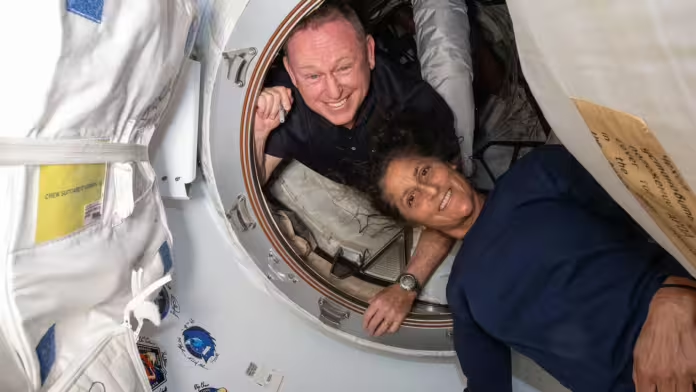Voting is a fundamental democratic right, and NASA has taken significant steps to ensure that American astronauts don’t miss their opportunity to vote—even if they’re hundreds of miles away from Earth on the International Space Station (ISS). While voting from space might sound like something out of a science fiction novel, it’s a real process that allows astronauts to participate in U.S. elections during extended missions.
With American space missions lasting six months or more, it became essential for NASA to find a way to enable astronauts to vote from orbit. This system ensures that astronauts remain connected to their civic duties on Earth, despite their extraordinary distance.

A Look Back: The History of Voting From Space
The journey to make voting from space a reality began in 1997, when the Texas Legislature passed a bill allowing astronauts to vote from orbit. Since NASA’s Johnson Space Center, located in Houston, Texas, manages human spaceflight for the U.S., many American astronauts call Texas their home. This legislation—known as the “space voting” bill—paved the way for a unique process enabling American astronauts to cast ballots from space.
Dr. David Wolf was the first astronaut to take advantage of this law. In 1997, while aboard the Russian Mir Space Station, Wolf cast his vote from space, marking a significant milestone at the intersection of civic duty and space exploration. Since then, NASA has continued to refine the process, ensuring all American astronauts can vote in national, state, and local elections during long-duration missions.
The Process: How Astronauts Vote From Space?
Voting from space involves close coordination between NASA, astronauts, and local election officials. Here’s a step-by-step breakdown of how the process works:
- Registration and Ballot Request: Astronauts, like all U.S. citizens, need to be registered voters. Before heading into space, they work with county officials to register and request an absentee ballot, specifically tailored for their situation.
- Electronic Ballot Creation: Once the ballot request is approved, a special electronic absentee ballot is generated by the county clerk’s office. This ballot is unique—it’s encrypted and securely transmitted to NASA’s Johnson Space Center.
- Secure Transmission to ISS: NASA plays a crucial role in delivering the ballot to the astronaut on the ISS. The encrypted ballot is sent to the ISS via a secure NASA email system. Astronauts receive an email with unique login credentials to access their ballot, ensuring that only they can open and complete it.
- Casting the Vote: After completing the ballot, astronauts email it back to the county clerk’s office using the same secure, encrypted channel. Election officials receive the completed ballot and treat it as a standard absentee vote, which is then counted in the election.
- Verification and Confidentiality: Throughout the process, stringent security measures are in place to verify the authenticity of the vote while protecting the astronaut’s privacy. The system is designed to ensure only the astronaut can access and submit their vote, preventing any tampering or unauthorized access.

The Challenges and Importance of Voting From Space
Enabling astronauts to vote from space underscores NASA’s commitment to ensuring American rights are upheld, no matter the circumstances. Voting from space presents unique challenges, including ensuring secure transmission and protecting the confidentiality of each vote. Additionally, since astronauts are subject to communication delays depending on their location and orbit, scheduling and timing are crucial. NASA and election officials work meticulously to make sure each astronaut can vote in time for their ballot to be counted.
From a broader perspective, space voting highlights the resilience and adaptability of democratic systems. Even as astronauts explore new frontiers, the fundamental right to vote remains protected. This innovation reflects the United States’ dedication to democracy, showing that, even in unusual circumstances, civic duties are respected.
Facts and Milestones in Space Voting
- First Space Vote: Dr. David Wolf cast the first-ever vote from space in 1997.
- Legislation: The Texas bill allowing space voting was passed in 1997, paving the way for NASA to implement secure electronic voting for astronauts.
- ISS Crew Voting: Since then, numerous American astronauts on the ISS have successfully voted from space, including during recent presidential elections.

Looking Ahead: The Future of Voting From Space
As space missions become longer and NASA and other agencies consider sending astronauts to Mars, voting from space may become routine. Mars missions, potentially lasting several years, will require more sophisticated methods of communication and voting infrastructure to ensure astronauts can participate in elections millions of miles away. While current technology allows secure electronic transmission for ISS astronauts, interplanetary voting will need further advancements to manage the substantial communication delays associated with deep space.
NASA’s commitment to supporting astronauts’ rights indicates the potential for democratic participation beyond Earth. As commercial space travel grows, there may be a need to create standardized protocols for space voting, expanding this right to private astronauts and possibly international space travelers who reside in the U.S.
Conclusion: The Power of Democracy, Even in Space
NASA’s initiative to ensure astronauts can vote from space is a testament to the power and flexibility of democracy. While the distance between Earth and the ISS is vast, the principles of civic duty bridge that gap, allowing American astronauts to remain active participants in their country’s democratic process. Voting from space represents a symbolic victory, showing that American values extend even into the cosmos.
As we look to a future where humanity may live and work beyond Earth, innovations like space voting remind us that democracy’s essence lies in participation, no matter where people are in the universe.

